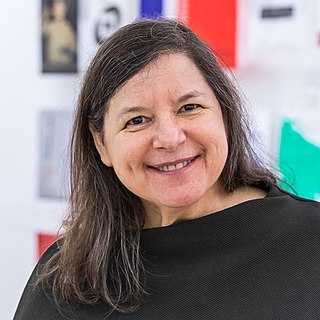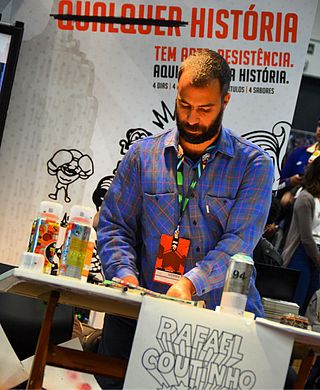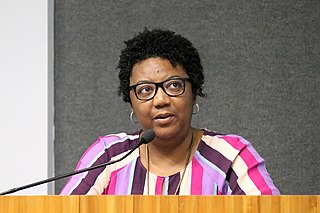Katie van Scherpenberg | |
|---|---|
 | |
| Born | Mildrid Catharina van Scherpenberg 1940 São Paulo, São Paulo State, Brazil |
Katie van Scherpenberg (born 1940) is a Brazilian artist. [1] [2] [3]
Katie van Scherpenberg | |
|---|---|
 | |
| Born | Mildrid Catharina van Scherpenberg 1940 São Paulo, São Paulo State, Brazil |
Katie van Scherpenberg (born 1940) is a Brazilian artist. [1] [2] [3]
van Scherpenberg studied at the University of Munich from 1962 to 1964. She studied under Oskar Kokoschka in Salzburg. In 1966, she studied printing at the Museum of Modern Art in Rio de Janeiro. [4] Since the 1980s, Scherpenberg's work has consisted of abstract painting. [5] Her use of extreme materials contributes to the meaning of her works. [6]
Lia Mascarenhas Menna Barreto is a Brazilian studio artist currently based in Rio Grande do Sul.

Ismael Nery was a Brazilian artist.
Brígida Baltar was a Brazilian visual artist. Her work spanned across a wide range of mediums, including video, performance, installation, drawing, and sculpture. She was interested in capturing the ephemeral in her artwork.

Rubens Gerchman was a Brazilian painter and sculptor. He was heavily influenced by concrete and neoconcrete art.

Gretta Sarfaty, born Alegre Sarfaty, is also known as Gretta Grzywacz and Greta Sarfaty Marchant, also simply as Gretta. is a painter, photographer and multimedia artist who earned international acclaim in the 1970s, from her artistic works related to Body art and Feminism. Born in Greece, in 1947, she moved with her family to São Paulo in 1954, being naturalized as Brazilian.

Jacqueline "Jac" Leirner is a Brazilian artist. Leirner is best known for the sculptures and installations she creates from mundane objects and ephemera, including devalued bank notes, used envelopes, promotional tickets, empty packs of cigarettes and plastic shopping bags.

Rafael dos Santos Coutinho is a Brazilian comics artist, painter and animator.
Márcia Pinheiro de Oliveira was a Brazilian performer and visual artist. Her performances, videos and installations deal with themes of sexuality, eroticism, consumerism, childhood and religion, often using sex toys, children's toys and religious artifacts.
Maria Auxiliadora da Silva (1935–1974) was a self-taught Brazilian painter. Her work was nationally and internationally acclaimed. Characterized by bold colors, thick textures, and mixed media, her paintings center largely on the following themes and genres: Everyday community life and popular manifestations in São Paulo, particularly in the neighborhoods of Brasilândia and Casa Verde; Afro-Brazilian religions, specifically Candomblé, Trinidad Orisha, and Umbanda; self-portraits in which she represents herself as an artist, a bride, and a woman living with cancer; intimacy and affection between women; and urban and rural life.
Tatiana Blass is a Brazilian artist that constructs complex abstract narratives with her performances, paintings, videos, and installations.
Lenora de Barros is a Brazilian artist and poet. She studied linguistics at the University of São Paulo before establishing her artistic practice during the 1970s, and has remained committed to the exploration of language through a variety of media, including video, performance, photography and installation.

Elisa Bracher is a Brazilian artist, mostly known for her wooden and stone monumental sculptures, as well as drawings and prints with organic or geometric features.

Instituto Itaú Cultural is a Brazilian not-for-profit cultural institute owned by Itaú Unibanco. The institute was founded by Olavo Egydio Setúbal and created under the Law nº 7505, of 3 October 1986. The institute's goal is to map artistic manifestations and to foster artistic research and production related to all cultural sections.
Abigail de Andrade (1864–1890) was a Brazilian painter. Abigail de Andrade's name, practically absent from art history books, is mentioned by the painter and art historian Theodoro Braga (1872-1953), who lists the few studies published about Abigail de Andrade in the book Artists Painters from Brazil, 1942.
Niobe Nogueira Xando Bloch was a Brazilian artist.
Grupo Ruptura was created by a collection of artists who sought to advance modern art in Brazil in the 1950s. Together, they held an exhibition entitled Ruptura at the São Paulo Museum of Modern Art in 1952. The group embraced concrete art as a break from traditional naturalistic painting popular in Brazil at the time. Grupo Ruptura's works are often characterized by strong geometric shapes and bold colors.

Mariza Dias Costa was a Guatemalan-Brazilian political cartoonist and illustrator who influenced her genre with her novel approach.

Rosana Paulino is a Brazilian contemporary artist, curator, and researcher. Paulino holds a doctorate in Visual Arts from the University of São Paulo, School of Communications and Arts and a specialization in printmaking from London Print Studio. She was awarded the Mercosur Konex Award from Argentina in 2022. Paulino engages with mediums including drawing, embroidery, engraving, printmaking, collage, and sculpture, often to engage with archetypes, memory, familial legacies, histories of racial violence and slavery in Brazil and to explore, what she describes as, Black female psychology. Her works have been displayed in several shows in the UK, France, Belgium, Italy, Spain, Portugal, Cape Verde, Puerto Rico, USA, Mexico, and Brazil. She has had solo exhibitions in Belgium, Germany, and Brazil.
Luisa Malzone Strina is a Brazilian art gallerist and art collector. Her gallery, Galeria Luisa Strina, is the oldest contemporary art gallery in Brazil.
Mariannita Luzzati is a Brazilian visual artist from São Paulo, recognized for her extensive study of landscapes.